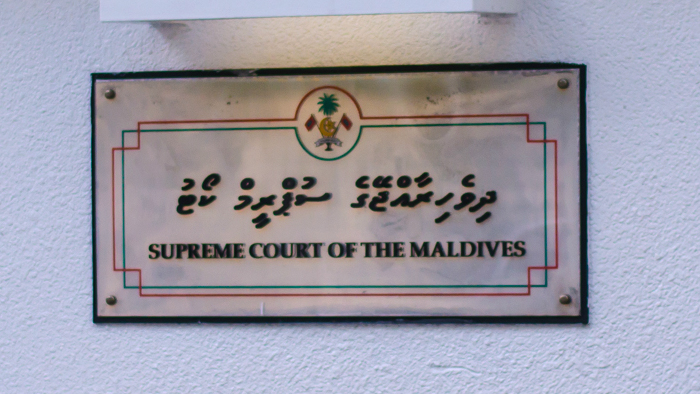The Supreme Court has issued new rules requiring judges requesting transfer to a different court to seek approval from the apex court.
The rules (Dhivehi) enacted yesterday stipulate that judges of lower courts seeking transfer must write to the Supreme Court stating the reason for the change.
“The transfer of a judge of a lower court from one court to another shall be decided by a majority of the Supreme Court bench,” states section five of the rules.
Former Judicial Services Commission member Aishath Velezinee has accused the court of taking administrative control of the judiciary, while the UN has previously suggested the independence of lower courts is being compromised.
Once a decision is reached, the new rules state that the reappointment would be made by the Judicial Service Commission (JSC) based on the Supreme Court’s proposal. The judge would be given time to conclude cases before the transfer is finalised.
Judges must have served at least two years in the court they were appointed to before the request could be considered.
Before proposing the transfer to the JSC, the rules state that the Supreme Court bench must ensure the importance of the judge working in a different court based on academic qualifications and experience and consider whether the judge has relevant experience better suited to a different court.
For evaluation of the request, the apex court should also consider the quality of work done by the judge, the number of cases heard by the court or judicial area, the number of unfinished cases, the number of judges in the court or judicial area to which the transfer has been requested, and the population of the judicial area.
Outspoken whistleblower, Velezinee, told Minivan News today that the Supreme Court was taking over functions of the JSC.
“The Supreme Court is systematically taking control of the judiciary and misconstruing the Constitution for their benefit,” she said.
“The JSC is controlled by the Supreme Court and remains silent on these matters, facilitating the Supreme Court take over.”
The promotion and transfer of judges was previously overseen solely by the JSC. Last month, the JSC demoted former Chief Judge of the High Court, Ahmed Shareef, to the Juvenile Court as a disciplinary measure.
Under the Judges Act passed in 2010, transfer of judges was to be made by the Judicial Council, before the Supreme Court struck down the relevant articles in the Judicature Act, abolishing the council.
“Take over”
In May, the Supreme Court enacted new rules stipulating that the Department of Judicial Administration (DJA) – tasked with management of the courts and public relations as well as providing facilities, training, archiving systems and security for judges – will function in accordance with policies set by the apex court bench and under the direct supervision of a designated justice.
Velezinee stressed at the time that the administration of justice and the administration of the courts were “two different though interconnected issues.”
“The Supreme Court is misconstruing article 156 of the Constitution and the appointment of a Supreme Court judge to [oversee] the DJA is tantamount to control of the courts,” she contended.
In a comprehensive report on the Maldivian judiciary released in May 2013, United Nations Special Rapporteur for the Independence of Judges and Lawyers, Gabriela Knaul, wrote that “the dissolution of the Judicial Council and the direct control of the Supreme Court over the [DJA] have had the effect of centralising administrative decisions in the hands of the Supreme Court.”
“This has undoubtedly contributed to the strong impression that lower courts are excluded from the administration of justice and decision-making processes,” she noted.
She also referred to “several complaints about internal tensions in the judiciary, where lower courts are left with the feeling that the Supreme Court only works for its own interests, without taking into account the situation of other judges and magistrates.”
Earlier this month, the Supreme Court informed lower courts that it would be appointing magistrates to take over cases where magistrates have recused themselves.
The apex court noted that it has learned of magistrate courts writing to the JSC to appoint magistrates in cases where the presiding magistrate had excused himself.
Noting that the Supreme Court was the “highest authority for the administration of justice” under Article 141 of the Constitution and referring to a circular issued on August 10, 2011 – which stated that the Supreme Court would specify rules for appointing magistrates following recusal – Chief Justice Ahmed Faiz Hussain asked magistrate courts to write to the Supreme Court if a magistrate recuses himself from a case.
In May, the Supreme Court also formulated new regulations making it mandatory for judges and judicial employees to seek permission to attend overseas workshops, seminars, conferences, or training programmes.
Likes (1)Dislikes
(1)Dislikes (0)
(0) 